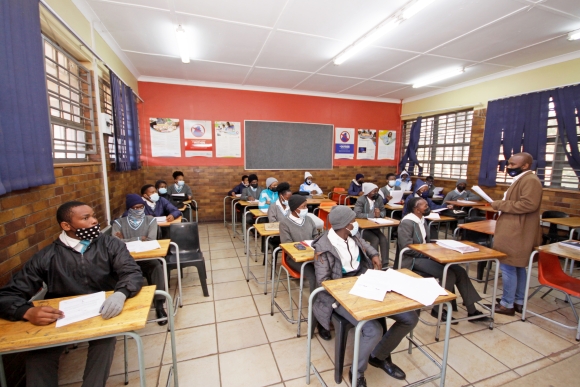COVID-19 changed everything in 2020. The world as we knew it experienced unprecedented job losses, business closures and an increased dependency on government grants and specialised loans just to survive.
Education systems were unprepared for the turmoil unleashed because of the pandemic and subsequent lockdowns. Schools, teachers, and administrators were forced to immediately build emergency remote-learning systems and, later, social distancing measures in many rural schools that were already overcrowded and ill-equipped. This threw the spotlight on access to digital devices, connectivity, having a quiet place to work, and the problem of stubborn inequality.
In South Africa, the reality was just as bleak, possibly even bleaker, as the education system is extensive, with approximately 13 million learners and unequal and socially graded schools. Although significant improvement has occurred, the achievement outcomes are still low, fragile, and susceptible to shocks. The COVID-19 pandemic has dealt the education system a significant blow, especially for the poor and vulnerable learners.
Better resourced homes and schools were able to move to digital forms of learning and proceed with standard curriculum coverage. Despite the best intentions, most learners had very little structured learning.

The South African education system, characterised by crumbling infrastructure, overcrowded classrooms and relatively poor educational outcomes, is perpetuating inequality and, as a result failing too many of its children, with the poor most brutally hit.
“For South Africa to comply with its own constitutional and international human rights obligations concerning education, major change is urgently needed”, said Shenilla Mohamed, Executive Director of Amnesty International South Africa.
Due to the education strain, ACTOM has become actively involved in developing communities near their various divisions and has seen great successes in the Balmoral College in Boksburg, achieving a 100% pass rate in previous years. Sylvester Makamu, HR Executive, ACTOM, says: “We are always looking at making a difference in our community. With our skills development programme taking off, it was time to look at the younger generation. We want to assist wherever we can to make a difference in a young person’s life. We saw what a difference our support has made to the scholars at Balmoral College, and we want to continue assisting wherever we can”, he added.
With the adoption of yet another school, ACTOM is actively involved in the growth and development of the youth at grassroots level. Sizwe Secondary School, based in Elandsfontein, Ekurhuleni, houses 1275 students with 34 educators, which ratios one teacher to every 60 students. Not only is this way overcrowding, but the principal and teachers face many other challenges. “The school is in dire need of maintenance. Not only does the school suffer from severe plumbing issues, but we also need a generator during load shedding,” said David Khosa, Sizwe School Principal.
Beyond infrastructure, other barriers that these children face to access a quality education include lack of sufficient transport, which often impacts their ability to access education and can put their safety at increased risk. Some children cross bustling main roads from the Knights area in Boksburg to the school in Elandsfontein. “There are no buses in the area that will ensure the children’s safety between school and home”, David Khosa added.
According to Makamu, “the school is in serious need of maintenance. We arrived in shoulder-height grass and had to walk over wastewater to access the classrooms and facilities, which is a serious health concern. We will employ members from the immediate community to assist with the maintenance at the school, which will also create community employment. We will also assess the asbestos classrooms, plumbing, and various other issues the school faces and deal with it one bite at a time”.
The assistance and sponsorship to Sizwe Secondary School will not stop at just maintaining and improving the facilities, “we are looking at the bigger picture of ensuring the students will be able to further their careers and complete their studies”, said Makamu. ACTOM will sponsor the tutoring of the top 20 grade 11 and 12 students at Sizwe Secondary School in the STEM fields to prepare them for university entrance. In 2023, ACTOM will extend its support to include the top 20 Maths and Life Science students from grades 8 to 12 in this STEM programme. “We want to walk a path with these students to ensure that they will be able to complete their studies”, he added.
Sizwe Secondary School will, in turn, continuously assess participating students to ensure they remain in the top 20 in their respective subjects. The tutoring will take place after school and on weekends.
ACTOM recognises that the future prosperity of South Africa lies firmly in the hands of the youth, and as such, it will remain actively involved at grassroots level by assisting schools and parents, where possible, to ensure that as many as possible of the next generation reach their full potential.

